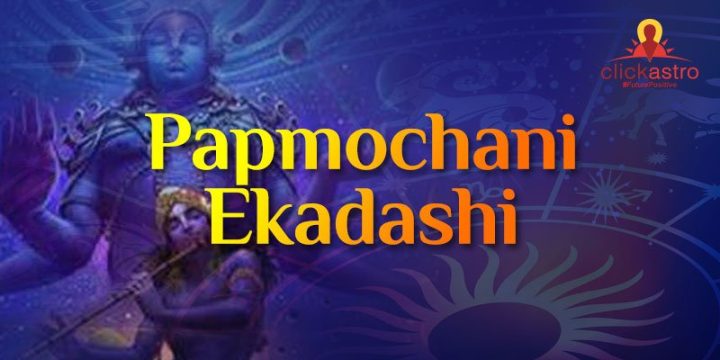Contents[hide]
What Is Papmochani Ekadashi?
Papmochani Ekadashi is celebrated during the Krishna Paksha (waning phase) of the Chaitra month according to the North Indian Purnimanta calendar and the Phalguna month as per the South Indian Amavasyanta calendar. It marks the final Ekadashi of the Hindu lunar calendar year. This Ekadashi falls in the period between Holika Dahan and Chaitra Navratri. In the Gregorian calendar, it typically falls in March or April. The name ‘Papmochani’ is derived from two words: ‘Pap’, meaning sin, and ‘Mochani’, meaning to absolve or release. Therefore, Papmochani Ekadashi is a day when devotees pray to Lord Vishnu for the absolution of their sins, both past and present.The Spiritual Significance of Papmochani Ekadashi
The core essence of Papmochani Ekadashi is the belief that fasting and worshipping Lord Vishnu on this auspicious day can cleanse a devotee of their sins and emotional burdens. It is considered a powerful time to clear the mind of negative thoughts, restore inner peace, and invite blessings for a prosperous life. By observing this day with sincerity, individuals seek to break free from worldly attachments and gain the clarity needed to live a fulfilling spiritual life.Papmochani Ekadashi 2025: Key Dates and Timings
- Ekadashi Tithi Begins: March 25, 2025, 05:05 AM
- Ekadashi Tithi Ends: March 26, 2025, 03:45 AM
- Sunrise: March 26, 2025, 6:29 AM
- Sunset: March 26, 2025, 6:35 PM
- Dwadashi End: March 27, 2025, 01:43 AM
- Parana Time: March 26, 2025, 01:41 PM – 04:08 PM
Rituals Associated with Papmochani Ekadashi Vrat
Like most Ekadashis, Papmochani Ekadashi is observed with fasting (Vrat) and specific rituals to honour Lord Vishnu. The Vrat generally begins the day before Ekadashi, on Dashami (the tenth lunar day). On the day of Ekadashi itself, devotees wake up early, take a holy bath, and perform prayers and rituals dedicated to Lord Vishnu. A key part of the Papmochani Ekadashi Vrat involves a fast, with some individuals choosing to fast completely without consuming food or water. For others, fasting can include the consumption of fruits, nuts, or water. Even those not observing the fast are encouraged to avoid grains, pulses, and non-vegetarian foods, which are considered unsuitable for the day. During the Vrat, it is also important to focus on the mental and spiritual aspect of the fast. Devotees refrain from negative emotions like anger, jealousy, and greed, and avoid lying or criticizing others. These actions help purify the mind, body, and soul and draw closer to Lord Vishnu’s divine energy.Breaking the Fast: Parana Ritual
The fast is traditionally broken on Dwadashi, the day after Ekadashi, after the sunrise, during the auspicious Parana time. Breaking the fast outside of the designated Parana time or during the Hari Vasara (the first quarter of Dwadashi) is considered inauspicious. Therefore, the most favourable time to break the fast is during Pratahkal (the early morning hours). If this is not possible, breaking the fast after Madhyahna (midday) is the next best option. There are two common ways to observe the Papmochani Ekadashi Vrat. The first is the one-day fast observed by the general devotees (Smarthas), while the second is a two-day fast observed by those seeking spiritual liberation (Sanyasis or Moksha seekers).Fasting Procedures on Papmochani Ekadashi
The fasting procedure for Papmochani Ekadashi begins the evening before the Ekadashi, with a person refraining from eating after sunset to ensure that the body is free from undigested food. Devotees are encouraged to wake up early on Ekadashi, bathe, and offer prayers to Lord Vishnu. Visiting a Vishnu temple and reciting sacred texts like Vishnu Sahasranama, the Bhagavad Gita, or other Vishnu mantras is believed to amplify the benefits of the day. On Dwadashi morning, after bathing, devotees worship Lord Vishnu again and then break the fast during the designated Parana time. The type of fasting followed can vary depending on personal health and circumstances. If a full fast is not feasible due to health concerns, individuals may opt to eat a single meal or consume permitted food items such as fruits, vegetables, nuts, and milk.Foods to Eat and Avoid During Papmochani Ekadashi
For those observing a partial fast, certain foods are considered permissible, while others must be strictly avoided.Permitted Foods:
- Fresh and dry fruits
- Vegetables like potatoes and sweet potatoes
- Nuts, milk, coconut, and vegetable oils
- Buckwheat flour, rock salt, sugar, and ginger
Foods to Avoid:
- Non-vegetarian food (meat, fish, eggs)
- Tea, coffee, soft drinks, or any other energy drinks
- Mushrooms, grains (like rice, wheat), and legumes
- Onions, garlic, and certain spices (such as mustard, asafoetida, cloves)
- Tamarind, sesame seeds, and other processed foods
Mythological Significance: The Story Behind Papmochani Ekadashi
The origins of Papmochani Ekadashi are found in the ancient scriptures, notably the Bhavishyottara Purana and Harivasara. The legend behind the day recounts the story of Sage Medhavi, a devout follower of Lord Shiva, who was performing intense meditation in the forest of Chaitraratha. This serene place caught the attention of Indra, the king of the heavens, who feared that Medhavi’s growing spiritual power might elevate him to a divine status. To distract Medhavi, Indra sent the apsara Manjughosa to seduce him. Despite her many attempts, Medhavi remained unshaken until the powerful god of love, Kamdev, intervened. With his magical powers, Kamdev made Medhavi fall prey to Manjughosa’s charm. Eventually, they married, but after many years, Manjughosa lost interest in Medhavi and abandoned him. Realizing that he had been misled, Medhavi cursed Manjughosa to become an ugly witch. Seeking redemption, Medhavi turned to his father, Sage Chyavana, who advised him to observe Papmochani Ekadashi. Medhavi did so with full devotion, and as a result, his sins were absolved. Manjughosa, too, repented and observed the fast, thereby regaining her lost charm. This story exemplifies the power of Papmochani Ekadashi in purging sins and transforming lives.Why Should You Observe Papmochani Ekadashi?
Observing Papmochani Ekadashi can offer several spiritual and material benefits.- Cleansing of Sins: By fasting and praying to Lord Vishnu, devotees believe that all their sins are washed away, leading to spiritual purity.
- Divine Blessings: The day brings the opportunity to receive Lord Vishnu’s eternal blessings for peace, prosperity, and joy.
- Spiritual Growth: Observing the fast helps individuals grow spiritually by focusing on self-discipline and devotion, reducing worldly distractions and attachments.
- Health and Wealth: According to many believers, following the Vrat brings physical well-being, prosperity, and abundance.
- Mental Clarity: The discipline of fasting helps clear mental fog and provides clarity in decision-making and life choices.









